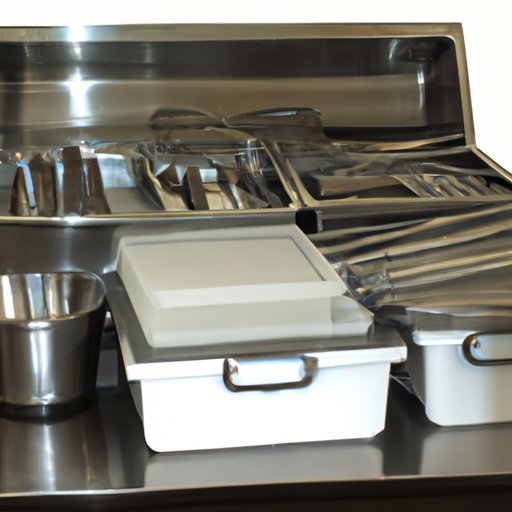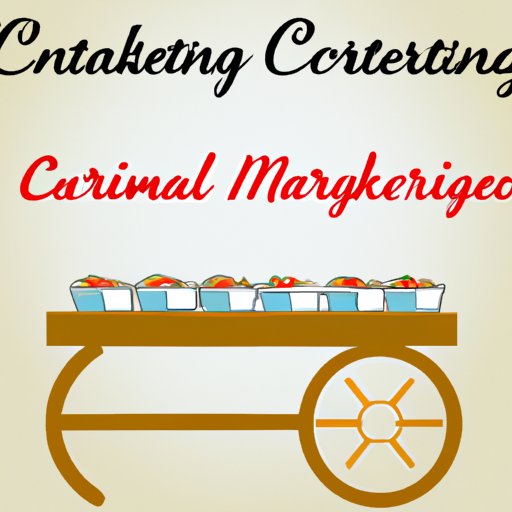Introduction
A catering business is a service-based business that provides food and beverages for events. From corporate events to weddings, catering businesses offer a variety of services to meet the needs of their clients. Starting a catering business can be an exciting and rewarding venture, but it does require a great deal of planning and preparation.
The benefits of starting a catering business include being able to work with a variety of people, creating delicious food experiences, and having the opportunity to make a living doing something you love. However, there are also several important regulations and considerations to take into account before launching a catering business, such as licensing and regulatory requirements, equipment and supplies needed, types of catering businesses, steps involved in setting up, financial requirements, and marketing strategies.
Licensing and Regulatory Requirements for Starting a Catering Business
Before starting a catering business, it’s important to understand the local, state, and federal regulations. Depending on where you plan to operate your business, you may need to obtain a license from your local government. You may also need to register with the state to collect sales tax or to obtain a food service license. Additionally, there are federal regulations that must be followed when preparing food for public consumption.

Necessary Equipment and Supplies Needed to Start a Catering Business
To get started in the catering business, you’ll need to have the proper kitchen equipment, serving supplies, and food storage containers. The type of equipment you’ll need will depend on the size and scope of your business. For example, if you’re planning to offer full-service catering, you’ll need to invest in larger pieces of equipment like ovens, freezers, and refrigerators. You’ll also need to purchase smaller items like pots, pans, utensils, and serving dishes.
In addition to kitchen equipment, you’ll need to have a variety of serving supplies such as plates, napkins, cups, silverware, and tablecloths. It’s also important to have the right food storage containers to keep food fresh during transport and at events. Investing in quality equipment and supplies is essential for a successful catering business.
Popular Types of Catering Businesses
There are a variety of catering businesses to choose from. Some of the most popular types of catering businesses include corporate events, weddings, and private parties. Corporate events often involve large-scale catering services, while weddings and private parties can involve small intimate gatherings. Knowing the type of catering you’d like to specialize in can help you focus your efforts and create a successful business.
Steps Involved in Setting Up a Catering Business
Once you’ve decided on the type of catering business you’d like to start, there are several steps involved in setting up a successful business. First, you should conduct market research to determine what type of services customers are looking for and how much they’re willing to pay. Next, you should create a business plan that outlines your vision, objectives, and strategies. After that, you’ll need to obtain the necessary licenses and insurance to legally operate your business.
You’ll also need to secure financing to cover startup costs. Once you have the finances in place, you can begin finding suppliers, designing menus, and hiring staff. These steps can help you set up a sound foundation for your catering business.

Financial Requirements for Starting a Catering Business
When starting a catering business, it’s important to consider the financial requirements. The cost of equipment and supplies can add up quickly, so it’s important to have a realistic budget in place. Additionally, you’ll need to factor in the cost of labor, as well as the cost of marketing and advertising. Having a clear understanding of the financial requirements can help ensure the success of your business.

Marketing Strategies for Promoting a Catering Business
Once you’ve established your business, it’s time to start promoting it. Networking is one of the best ways to spread the word about your services. Connecting with other business owners, wedding planners, event coordinators, and local vendors can help you build relationships and generate referrals. Social media can also be a powerful tool for promoting your business. Platforms like Instagram and Facebook allow you to reach a wide audience and showcase your services.
Traditional advertising methods such as print ads, radio spots, and television commercials can also be effective for promoting your catering business. Creating a website and optimizing it for search engines can also help you reach potential customers.
Conclusion
Starting a catering business requires a great deal of planning and preparation. It’s important to understand the local, state, and federal regulations, as well as the necessary equipment and supplies needed. Knowing the popular types of catering businesses and the steps involved in setting up can help you create a successful business. Additionally, it’s important to consider the financial requirements and develop an effective marketing strategy.
By taking the time to plan and prepare, you can create a profitable and successful catering business. With hard work and dedication, your business can become a thriving enterprise.
(Note: Is this article not meeting your expectations? Do you have knowledge or insights to share? Unlock new opportunities and expand your reach by joining our authors team. Click Registration to join us and share your expertise with our readers.)
